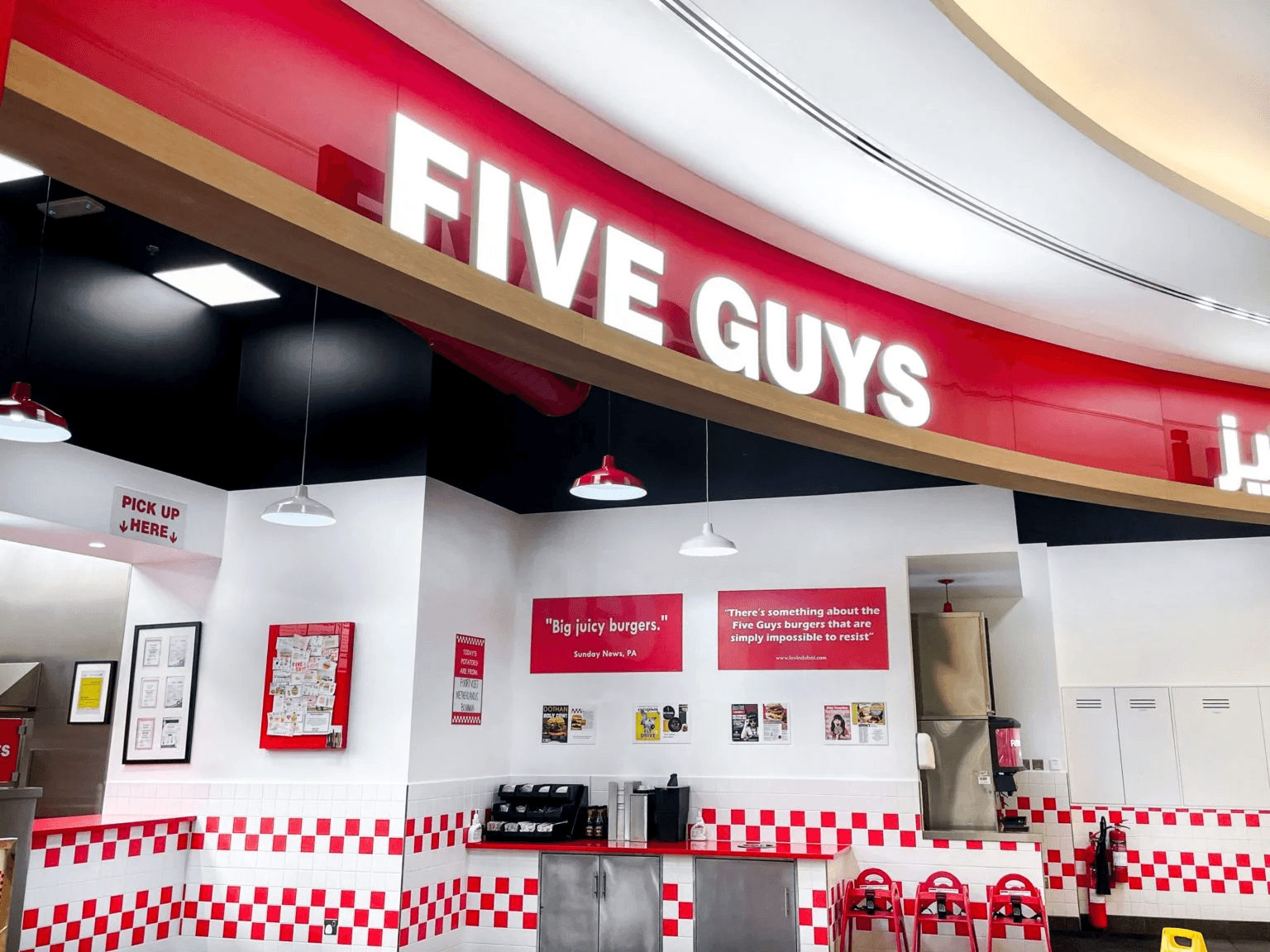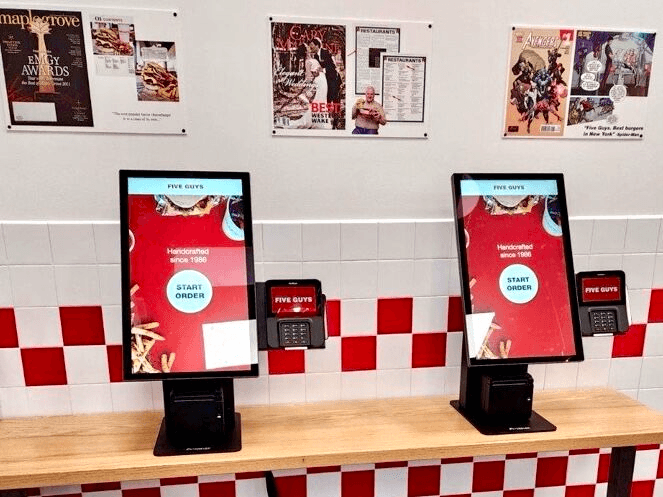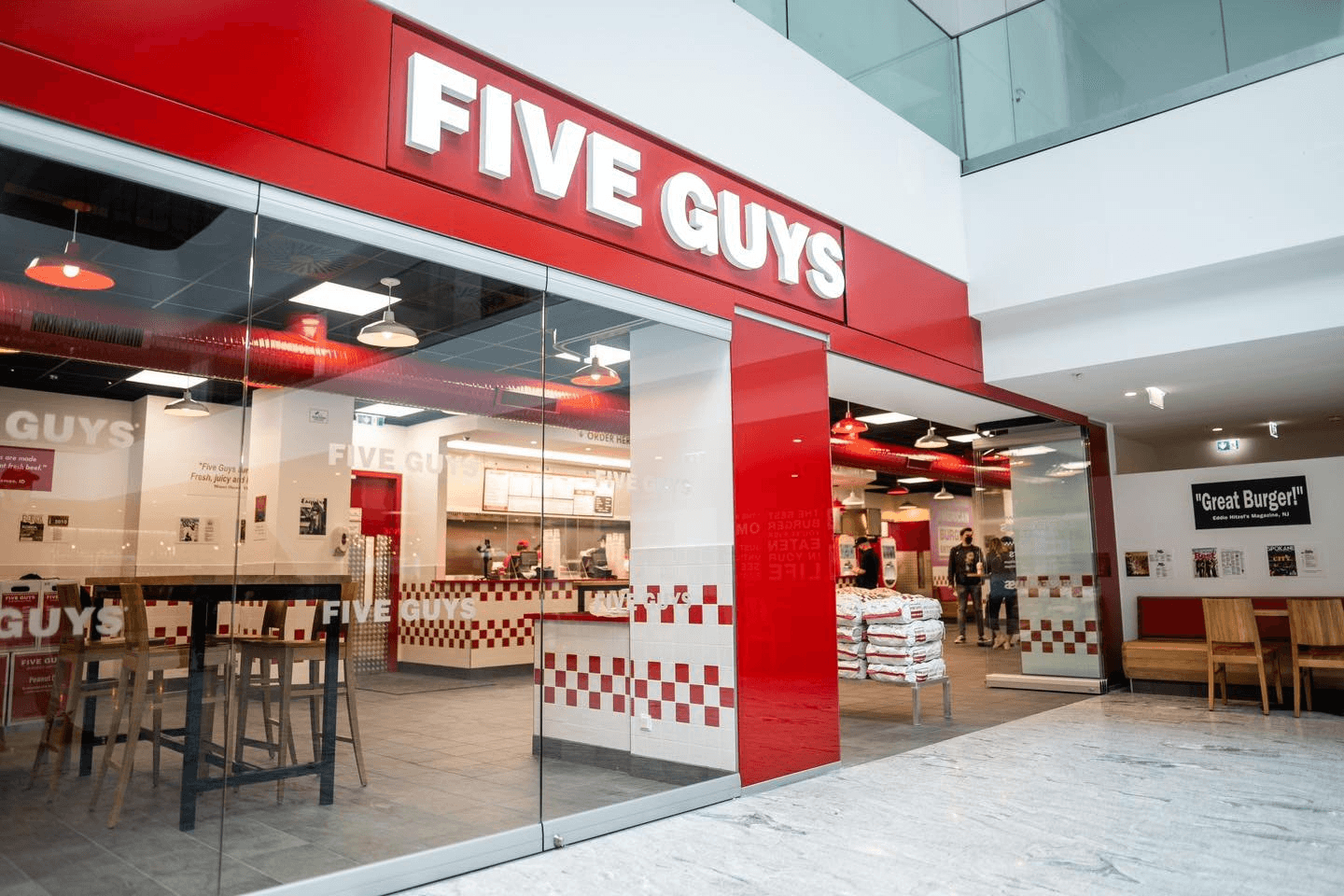CASE STUDY

Ryan
Solution Specialist

From managing multiple franchise locations to ensuring food quality and consistency, Five Guys needed to adopt a technology strategy capable of supporting its rapid expansion. To address these challenges, the company implemented a specialized tech strategy that focused on custom software development to streamline operations, optimize supply chains, and improve communication with franchisees.
This case study outlines the custom technology solutions that allowed Five Guys to efficiently manage its expansion, focusing on scalable and flexible software systems to address the complexities of its growing global footprint.
Challenges faced by Five Guys
As Five Guys expanded rapidly, several operational challenges arose, including:
Operational consistency across locations: Ensuring that every Five Guys location maintained the same level of quality and service was critical. The decentralized nature of the franchise model required better operational oversight.
Franchise communication and reporting: Managing real-time communication and performance reporting between the corporate office and franchisees became increasingly difficult as the chain grew globally (Deloitte)
Supply chain management: With operations spanning multiple regions and countries, Five Guys needed an efficient supply chain system that could track inventory, monitor supplier performance, and ensure compliance with food safety standards.
Labor and scheduling management: Handling labor management across numerous locations became increasingly complex, particularly when optimizing schedules based on real-time demand fluctuations.

How Five Guys leveraged custom software development
To overcome these challenges, Five Guys implemented a specialized technology strategy that centered on custom software solutions tailored to its unique operational needs. This tech strategy allowed the company to address the specific requirements of a large franchise operation while maintaining its commitment to quality and operational efficiency.
Custom franchise management platform: Five Guys introduced a custom franchise management system to streamline communication between franchisees and the corporate office. The system offered a centralized platform for reporting, financial tracking, and operational performance management.
Automated reporting: Franchisees could submit sales, labor, and financial data directly through the platform, allowing corporate leaders to track performance in real time.
Royalty calculations: The software automated royalty fee calculations, ensuring accuracy and reducing administrative workload for franchisees.
Standardized communication: The platform also standardized how the corporate HQ communicated updates, compliance requirements, and guidelines to franchisees.
.
Supply chain and inventory optimization: As Five Guys expanded globally, ensuring the availability and freshness of ingredients across locations was essential. The company developed a custom inventory and supply chain management solution that integrated with its suppliers to track real-time inventory levels, manage ordering, and ensure food safety compliance.
Predictive ordering: Using historical data and predictive models, the system automatically replenished inventory based on real-time sales patterns.
Supplier performance monitoring: The software tracked supplier delivery times, food safety compliance, and product quality, allowing Five Guys to make data-driven decisions about supplier relationships (Restaurant Business Online).
Waste reduction: By integrating predictive analytics, the system helped reduce food waste while ensuring each location had the necessary stock to meet customer demand.
Labor and scheduling automation: To ensure efficient operations and labor cost control, Five Guys deployed a custom labor management system that automated employee scheduling based on projected demand and historical traffic patterns.
Dynamic scheduling: The system provided franchisees with tools to automate staffing schedules based on local demand, traffic, and sales forecasts.
Compliance monitoring: The software ensured that franchisees adhered to regional labor laws, including minimum wage and overtime regulations, across various regions.
Payroll integration: The labor system integrated with payroll platforms, simplifying financial reporting and ensuring timely payments across the franchise network.
Real-time data and analytics platform: Five Guys implemented a custom data analytics platform that provided real-time insights into operational performance across all locations, enabling franchisees and corporate executives to make informed, data-driven decisions.
Operational dashboards: The platform allowed franchisees to monitor sales, labor costs, customer feedback, and operational efficiency in real time, helping them respond quickly to issues or opportunities.
Predictive analytics: The system used predictive algorithms to forecast demand, labor needs, and inventory requirements, allowing franchisees to make proactive decisions that optimized operational efficiency.
Scalable and efficient operation
The implementation of this specialized tech strategy yielded several key outcomes that supported Five Guys' growth:
Operational consistency: The custom franchise management system enabled standardized reporting and communication across all franchise locations, improving operational consistency and brand quality control.
Optimized supply chain: The supply chain system allowed Five Guys to monitor inventory levels in real time, reducing waste and ensuring the timely delivery of fresh ingredients to each location, even during periods of high demand.
Enhanced labor efficiency: By automating labor scheduling and payroll integration, Five Guys reduced administrative workload and optimized labor costs, ensuring that franchisees were properly staffed during peak hours while minimizing excess labor.
Data-driven decision making: The real-time analytics platform gave corporate and franchisees insights into operational performance, enabling more informed decisions regarding labor, inventory, and customer service. This increased overall efficiency and responsiveness.
A strategic approach to managing scale
Five Guys' specialized tech strategy played a pivotal role in its ability to scale rapidly while maintaining operational excellence. By investing in custom software solutions tailored to its needs, the company addressed critical challenges related to franchise management, supply chain optimization, labor efficiency, and operational consistency.
The result was a scalable, flexible technology platform that supported Five Guys' global expansion and ensured the company could maintain the high standards of quality and service that defined its brand. As restaurant chains grow, a similar investment in custom software development offers the flexibility, scalability, and control needed to manage complex operations and navigate the challenges of global expansion.
Takeaways for smaller and mid-sized restaurant chains
While Five Guys' tech strategy was designed to scale across hundreds of locations, there are valuable lessons that small and mid-sized restaurant chains can apply to their operations:
Invest in scalable solutions early: Even smaller chains can benefit from investing in custom software early in their growth phase. Scalable solutions like integrated POS and inventory management systems will allow small chains to manage day-to-day operations efficiently while also preparing for future growth. This prevents the need to overhaul systems as the chain expands.
Centralize operations: For mid-sized chains, custom software that centralizes menu management, pricing, and supply chain oversight can help ensure consistency across multiple locations. This is particularly important as chains grow regionally, where operational consistency and customer experience are critical to maintaining brand loyalty.
Enhance data-driven decision making: Smaller chains may not have the resources for large-scale predictive analytics, but even a basic custom analytics dashboard can provide insights into sales trends, labor efficiency, and customer preferences. These insights help owners make informed decisions on promotions, staffing, and inventory.
Improve labor and scheduling efficiency: For both small and mid-sized chains, custom-built labor scheduling tools can reduce staffing inefficiencies, especially during peak hours or seasonal fluctuations. Automation and integration with payroll systems ensure compliance with labor laws and optimize labor costs.

